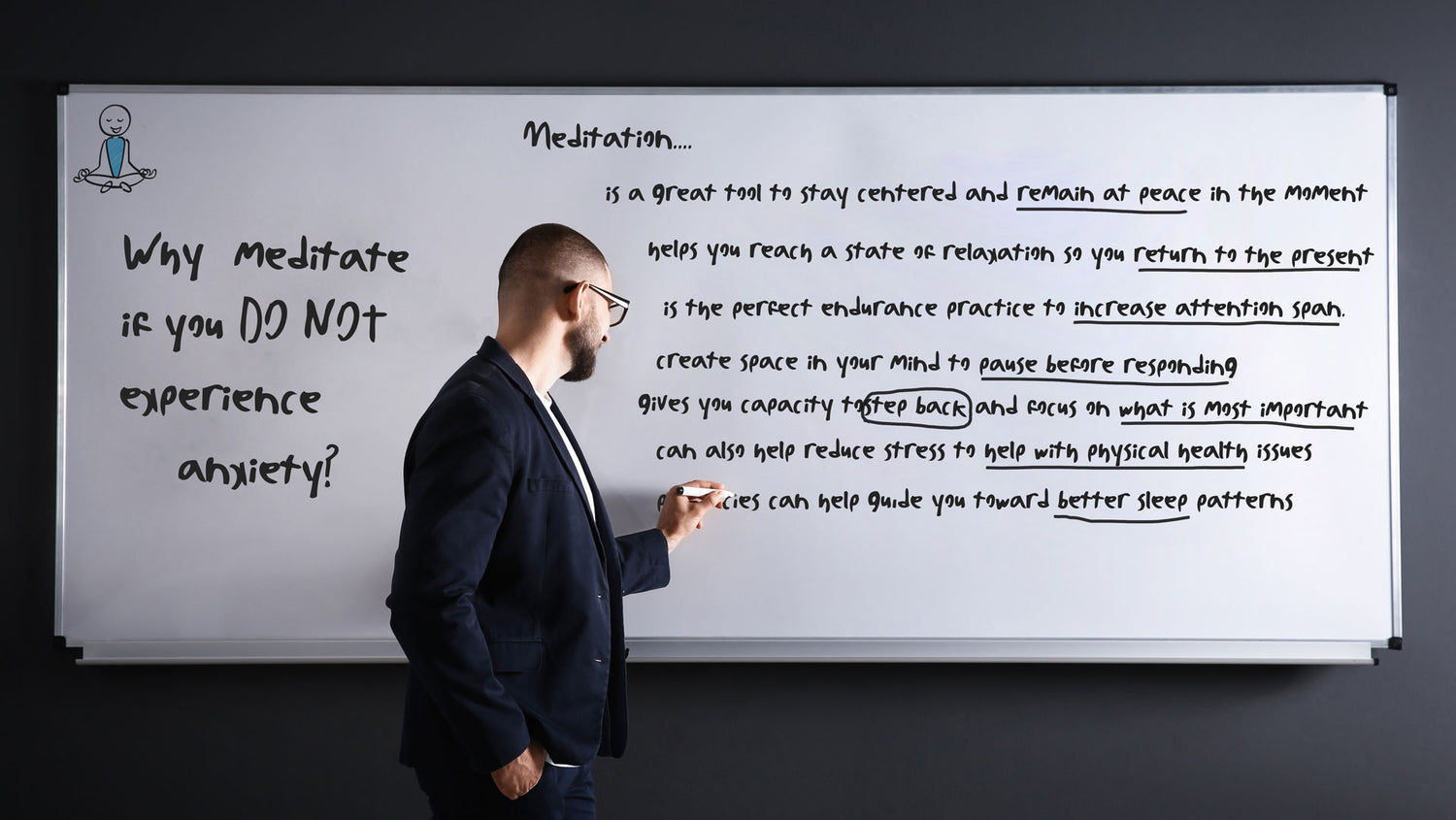It is no secret that meditation can help manage and reduce anxiety, but it remains a secret for some that this is not the only reason to meditate. Meditation is beneficial for everyone, no matter how you are feeling.
There are many reasons why you should meditate even if you DON'T feel anxiety. People have been meditating for thousands of years for different reasons. For example, the English word 'meditation' is from the Latin term meditatum, which means “to ponder.”
People have practiced different meditation techniques because of the multitude of benefits of meditation. So, if you're asking yourself, 'should I meditate if I'm not anxious?' the answer is yes!
1. Consistent Meditation Practice
Research has found that, on average, it can take 66 days to form a new habit. Meditating daily helps keep your practice consistent, making it easier to do even when you are not feeling 100%.
It can be challenging to attempt meditation only when you are feeling anxious. However, if you have already established meditation practice, it becomes automatic, no matter how you feel. This consistency means you can reap the maximum benefits of meditation for your mind, body, and spirit at all times.
2. Maintains Emotional Well-being
It is great if you are not feeling anxious, but it is important to have practices that help maintain your emotional well-being. Anyone can experience declines in their emotional well-being if they are not taking steps to care for themselves.
Meditation is a great tool to stay centered, as you can begin to detach yourself from your thoughts and remain at peace. You will also become more self-aware, meaning you can recognize times when you start to feel emotionally unregulated and can take steps to manage the situation.
Research supports meditation's positive impact on emotional well-being. For example, studies have found that meditation can reduce inflammatory chemicals called cytokines, which are released when you are stressed and can impact mood.
3. Reduces Stress
Mindfulness practices such as meditation are great ways to help reduce stress by reducing inflammatory responses and helping calm the mind. It is natural to feel stressed at times; however, periods of chronic stress can lead to increased levels of hormones that can trigger mental health difficulties such as anxiety.
Meditation helps you reach a state of relaxation and enables you to return to the present moment, calming your mind and body. You can also use meditation aids such as a meditation chair with back support to help improve your posture and relieve tension in the body. A huge benefit of meditation is that it is accessible anywhere too, which means you can stay calm even in stressful situations no matter where you are.
4. Enhances Focus and Attention
Meditation can enhance your life in many ways, including improving your focus and attention. Just like your body, your mind needs a workout. Meditation is the perfect endurance practice to increase your attention span. Better focus and attention can help you in all areas of your life, from communication with loved ones to your performing well at your job.
When you meditate, you clear your mind and detach yourself from feelings. This enables you to make more focused decisions and stay calm in times of stress. It can help you maintain your attention even when there are many distractions around you.
5. Improves Sleep
Lack of sleep is a huge contributor to stress, anxiety, and other issues such as physical or mental health problems. Meditation can help you redirect your thoughts and clear your mind for a better night's sleep or if you were awoken in the middle of the night and couldn’t fall back asleep. You can also direct your attention to any parts of the body that are tense and may be preventing you from falling asleep.
Many studies have found meditation techniques can help reduce insomnia and improve sleep. You can use a specific sleep meditation or your regular practice to prepare for a night of deep sleep.
6. Prevents Health Issues
Meditation does not only manage emotional well-being but your physical well-being too. It can help prevent age-related memory loss and decrease blood pressure. High blood pressure can contribute to many health issues, such as increasing the risk of heart attack and stroke risk.
Studies have found that meditation reduces blood pressure. It is thought that it does this by relaxing nerve signals that control the 'fight or flight' response, heart functions, and blood vessel tension in your body. Meditation can also help reduce stress, which can contribute to high blood pressure and other physical health issues.
Even if you have physical constraints, there are ways to make meditation comfortable and even improve your posture, which can minimize pain. For example, you can use a meditation kit to help support your meditation positions.
7. Manages Pain
Millions of people experience chronic pain in the US, which can be debilitating to everyday functioning. Meditation can be a helpful method to manage pain and prevent pain from causing increased levels of stress or anxiety. It cannot remove the pain, but it can allow you to relax, observe, and overcome discomfort.
Studies have found that mindfulness meditation and other meditation techniques can help people's pain tolerance. It is thought that practices such as guided imagery meditation and transcendental meditation can help focus awareness on the present moment. Meditation also helps relax the mind and body, increasing the release of 'feel good' hormones, such as endorphins.
8. Present Moment
Meditation can help you stay in the present moment. We only have a finite amount of time in this life. It is so easy to get distracted and overloaded with jobs, chores, and daily tasks. Mindfulness meditation can help you note these distractions and then step back and focus on what is most important to you.
Life can pass us by so quickly. Meditating daily gives you the time to clear your mind. You can then focus on what is most important to you.
9. Tool for Difficult Situations
Practicing meditation helps you when difficult situations arise. Rather than quickly reacting to a problem in a reflexive negative and damaging way you have the mental patience to observe the situation and then react in the most beneficial manner.
Practicing meditation techniques such as breathwork can aid in managing your emotions in heated moments. When something negative happens you have developed the mental fortitude from meditating to pause and then make a choice of how you’d like to react.
Why You Should Meditate Even if You DON'T Feel Anxiety
There are many benefits of meditation, which means there are also many reasons why you should meditate even if you DON'T feel anxiety. Meditation can help many mental health difficulties, such as anxiety; however, this is not the only reason to meditate.
Meditation can prevent issues with physical and mental health. It does not only help maintain your well-being, but it can also enhance it. Like exercise and healthy eating, it can become a part of your everyday routine to stay physically, mentally, and spiritually well. Meditation can give you tools to better your life and use in a variety of situations.
If you are ready to start meditating, check out our meditation accessories designed to aid and enhance your practice, so you can reap all the benefits of meditation.



